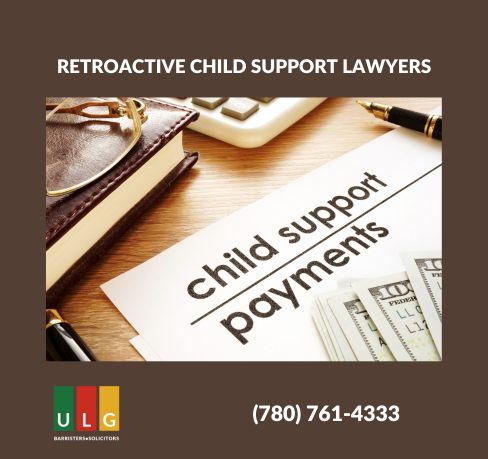Child support is a fundamental obligation for parents, aimed at ensuring the welfare and financial well-being of children following the separation or divorce of their parents. In Edmonton, Alberta, this financial responsibility is taken seriously, and courts emphasize the rights of children to benefit from the support of both parents. Sometimes, however, child support obligations may not be met in a timely manner, leading to requests for retroactive child support.
At Ulasi Law Group, a leading family law firm based in Edmonton, Alberta, we specialize in advocating for the financial rights of children and parents in the context of child support. Retroactive child support is a crucial area where misunderstandings often arise. This guide outlines the legal framework, eligibility, and processes related to retroactive child support in Edmonton, as well as how Ulasi Law Group assists clients in navigating these complex issues.
What is Retroactive Child Support?
Retroactive child support refers to payments that are owed to a custodial parent for periods in the past when the non-custodial parent should have been paying support but did not meet their obligations. This is distinct from regular child support, which is typically calculated from the date of application moving forward. In retroactive cases, courts assess whether past payments were insufficient or non-existent, and if so, the non-custodial parent may be ordered to “catch up” by paying a lump sum for missed payments.
Retroactive child support claims can arise in several situations, such as:
- The non-custodial parent did not pay any child support for a period of time.
- The income of the paying parent significantly increased, but the child support amount was not adjusted.
- There was a delay in applying for or adjusting child support despite a justified need for support during a previous period.
Legal Framework for Retroactive Child Support in Alberta
In Edmonton, as throughout Alberta, the legal basis for child support, including retroactive claims, is grounded in the Federal Child Support Guidelines under the Divorce Act (if parents are divorced) and Alberta’s Family Law Act (if parents are unmarried or separated but not divorced). These guidelines define the amount of child support based on the paying parent’s income, the number of children, and the applicable support tables.
For retroactive child support, courts rely on precedents set by landmark cases such as the Supreme Court of Canada’s decision in D.B.S. v. S.R.G. (2006). This case established principles that guide the courts in determining whether retroactive support should be awarded. The following factors play a critical role:
- Blameworthy Conduct: Did the non-custodial parent actively try to avoid or delay paying child support? Courts assess whether there was any intentional or negligent behaviour in avoiding financial obligations.
- Delay in Seeking Support: Was there an unreasonable delay in the custodial parent requesting child support? Courts expect the custodial parent to act promptly when they realize there is a need for support.
- Children’s Circumstances: Were the children negatively affected by the absence of support during the retroactive period? The focus remains on the best interests of the child.
- Hardship to the Paying Parent: Would retroactive payments impose an undue financial burden on the non-custodial parent? Courts aim to balance fairness to both parties while prioritizing the welfare of the child.
When Can Retroactive Child Support Be Claimed?
In Alberta, the courts allow retroactive child support to be claimed under specific conditions. Here are common situations where parents may seek retroactive child support:
- Increased Income of the Paying Parent: If the non-custodial parent’s income increased significantly, but they did not inform the other parent or adjust child support payments accordingly, a retroactive support order may be granted.
- Failure to Pay the Appropriate Amount: If a parent did not pay child support according to their income or based on an agreement, the custodial parent can seek retroactive compensation for the difference.
- Delayed Application for Support: Even if a custodial parent delays applying for child support, they may still be entitled to payments for past periods, especially if the delay is due to valid reasons such as a lack of legal knowledge or intimidation by the other parent.
At Ulasi Law Group, we work closely with our clients to identify if they are eligible for retroactive child support and gather the necessary documentation to support their case. Our approach is tailored to protect the best interests of the child while ensuring that both parents meet their financial obligations.
How Courts Determine the Amount of Retroactive Child Support
Calculating the amount of retroactive child support requires examining the paying parent’s income during the period in question. The court will look at the paying parent’s tax returns, financial records, and any other evidence indicating their earnings at the time when child support should have been paid or adjusted.
Once the income is established, the amount of child support is calculated based on the Federal Child Support Guidelines. If the paying parent’s income fluctuated during the retroactive period, the court may adjust the support amount for each year or time period accordingly.
The duration for which retroactive child support is granted varies, but it generally spans back three years from the date of the application. However, under certain circumstances, the court may extend the retroactive period, especially if there was “blameworthy conduct” on the part of the paying parent, such as deliberately concealing income or misleading the custodial parent.
Challenges in Retroactive Child Support Claims
While retroactive child support is legally enforceable, it is not without challenges. Some common hurdles include:
- Lack of Documentation: To successfully claim retroactive support, it is crucial to have accurate documentation of the paying parent’s income and any previous child support agreements or court orders. Without these records, it can be difficult to prove how much support is owed.
- Income Variability: Self-employed parents or those with fluctuating incomes may present challenges in accurately determining how much child support should have been paid.
- Financial Hardship on the Paying Parent: Retroactive child support payments can sometimes create significant financial strain on the paying parent, particularly if they are ordered to pay a lump sum. Courts may reduce the amount of retroactive support or allow for payments over time if the non-custodial parent proves financial hardship.
At Ulasi Law Group, our family lawyers are skilled at navigating these challenges. We assist clients in gathering evidence, assessing the income of the non-custodial parent, and building a strong case for or against retroactive child support claims.
How Ulasi Law Group Can Help
Navigating a retroactive child support claim can be overwhelming and emotionally charged, especially when there are disputes over past obligations. At Ulasi Law Group, our family lawyers in Edmonton, Alberta, have extensive experience handling retroactive child support claims and providing comprehensive legal advice tailored to each client’s unique situation.
Whether you are a custodial parent seeking retroactive support or a non-custodial parent disputing a claim, we can help you understand your rights and obligations under Alberta’s family law. Our services include:
- Legal Consultation: We offer a thorough evaluation of your case to determine whether retroactive child support is warranted and advise on the best course of action.
- Financial Analysis: We work with financial experts to analyze income documentation and ensure that child support amounts are calculated accurately.
- Negotiation and Mediation: Whenever possible, we aim to resolve disputes amicably through negotiation or mediation, ensuring that both parties can reach a fair agreement without the stress of lengthy court proceedings.
- Court Representation: If negotiations fail, our experienced family lawyers will represent you in court, advocating for your rights and the best interests of the children involved.
Conclusion
Retroactive child support is a critical tool for ensuring that children receive the financial support they are entitled to, even when payments have been missed or underpaid in the past. However, the process of claiming or disputing retroactive support can be legally complex, requiring a careful understanding of Alberta’s family law.
At Ulasi Law Group, we are committed to providing compassionate and effective legal representation to clients facing retroactive child support issues in Edmonton, Alberta. Our goal is to ensure that both parents fulfill their obligations and that the financial needs of children are met.
If you believe you may be entitled to retroactive child support or if you are facing a claim, contact Ulasi Law Group today to schedule a consultation and get the expert legal advice you need to protect your rights and your family’s future.

